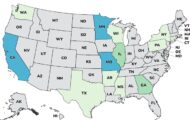Fish consumption guidance for the Mississippi River south of the metro Twin Cities has been updated by the Minnesota Department of Health (MDH). The problem is that a mixture of pollutants, including per- and polyfluoroalkyl substances (PFAS), have been found in fish tissue.

PFAS are harmful chemicals that can accumulate in fish and animals and in people. They resist oil, water, grease, and heat and are used in water-resistant fabrics, paints, and cleaning products. Some PFAS are authorized for use in food packaging, cookware, and food processing equipment. PFAS are linked to various cancers and developmental effects in children. The chemicals have been used for decades and do not degrade or break down in the environment. The state has been taking action to eliminate PFAS.
The new fish consumption guidance is issued with the support of the Minnesota Department of Natural Resources (DNR) and the Minnesota Pollution Control Agency (MPCA). The guidance applies to U.S. Lock & Dam #2 Pool in Dakota County near Saint Paul Park, U.S. Lock & Dam #3 Pool in Goodhue County near Etter, and U.S. Lock & Dam #4 Pool in Wabasha County near Wabasha, including all Minnesota lakes and backwaters.
The guidance for Pools 3 and 4 is new. The guidance for Pool 2 is more stringent than the guidance that was issued last summer. The MPCA gave the data to toxicologists and risk assessors at MDH, who then updated the guidance.
The guidance recommends that anyone who is or may become pregnant, and those who are breastfeeding or plan to breastfeed, along with children under the age of 15 should not eat fish harvested from those locations. Anyone else should limit consumption of this fish to one serving a month.
MDH Assistant Commissioner Myra Kunas said in a statement, “For most people, fish are part of a nutritious, well-balanced diet, because they provide a good source of protein and are rich in essential vitamins and minerals, but the Minnesota Department of Health encourages people to limit their intake of fish from certain waterbodies to avoid potential negative health impacts.”
The state is implementing a new law prohibiting PFAS in products, called Amara’s Law, which was passed and signed in 2023. The law ends avoidable PFAS use in Minnesota by 2032, with prohibitions on PFAS in some categories beginning in 2025.




